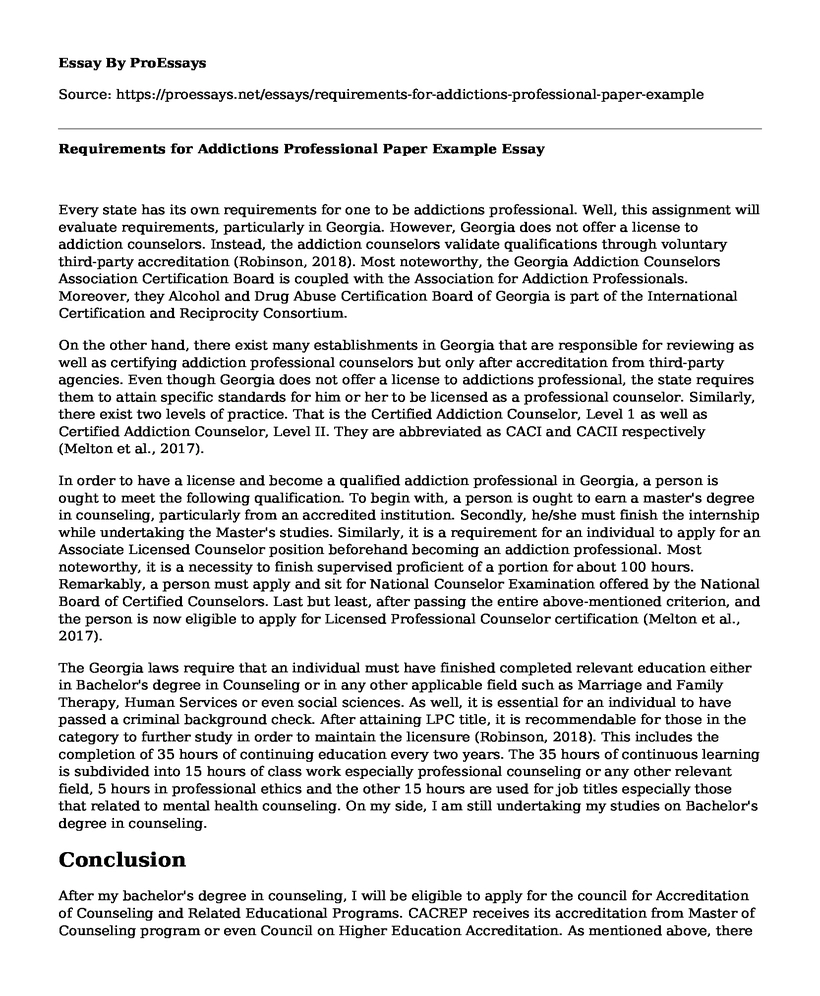Every state has its own requirements for one to be addictions professional. Well, this assignment will evaluate requirements, particularly in Georgia. However, Georgia does not offer a license to addiction counselors. Instead, the addiction counselors validate qualifications through voluntary third-party accreditation (Robinson, 2018). Most noteworthy, the Georgia Addiction Counselors Association Certification Board is coupled with the Association for Addiction Professionals. Moreover, they Alcohol and Drug Abuse Certification Board of Georgia is part of the International Certification and Reciprocity Consortium.
On the other hand, there exist many establishments in Georgia that are responsible for reviewing as well as certifying addiction professional counselors but only after accreditation from third-party agencies. Even though Georgia does not offer a license to addictions professional, the state requires them to attain specific standards for him or her to be licensed as a professional counselor. Similarly, there exist two levels of practice. That is the Certified Addiction Counselor, Level 1 as well as Certified Addiction Counselor, Level II. They are abbreviated as CACI and CACII respectively (Melton et al., 2017).
In order to have a license and become a qualified addiction professional in Georgia, a person is ought to meet the following qualification. To begin with, a person is ought to earn a master's degree in counseling, particularly from an accredited institution. Secondly, he/she must finish the internship while undertaking the Master's studies. Similarly, it is a requirement for an individual to apply for an Associate Licensed Counselor position beforehand becoming an addiction professional. Most noteworthy, it is a necessity to finish supervised proficient of a portion for about 100 hours. Remarkably, a person must apply and sit for National Counselor Examination offered by the National Board of Certified Counselors. Last but least, after passing the entire above-mentioned criterion, and the person is now eligible to apply for Licensed Professional Counselor certification (Melton et al., 2017).
The Georgia laws require that an individual must have finished completed relevant education either in Bachelor's degree in Counseling or in any other applicable field such as Marriage and Family Therapy, Human Services or even social sciences. As well, it is essential for an individual to have passed a criminal background check. After attaining LPC title, it is recommendable for those in the category to further study in order to maintain the licensure (Robinson, 2018). This includes the completion of 35 hours of continuing education every two years. The 35 hours of continuous learning is subdivided into 15 hours of class work especially professional counseling or any other relevant field, 5 hours in professional ethics and the other 15 hours are used for job titles especially those that related to mental health counseling. On my side, I am still undertaking my studies on Bachelor's degree in counseling.
Conclusion
After my bachelor's degree in counseling, I will be eligible to apply for the council for Accreditation of Counseling and Related Educational Programs. CACREP receives its accreditation from Master of Counseling program or even Council on Higher Education Accreditation. As mentioned above, there two levels of practice for addictions professional that is the CACI and CACII. CACII is the highest level and a person must have a degree at the bachelors in counseling or any other relevant field (Robinson, 2018). On the other hand, a person must have completed 270 hours of education expressly in cultural diversity. On the other, it is a requirement in this category to have completed 6,000 hours of practice together with 144 hours of comprehensive research (Robinson, 2018).
References
Melton, G. B., Petrila, J., Poythress, N. G., Slobogin, C., Otto, R. K., Mossman, D., &Condie, L. O. (2017). Psychological evaluations for the courts: A handbook for mental health professionals and lawyers. Guilford Publications.
Robinson, S. R. (2018). Moral Reasoning and Authenticity in Paraprofessional and Professional and Recovering and Non-recovering Addiction Counselors (Doctoral dissertation, University of Holy Cross).
Cite this page
Requirements for Addictions Professional Paper Example. (2022, Sep 20). Retrieved from https://proessays.net/essays/requirements-for-addictions-professional-paper-example
If you are the original author of this essay and no longer wish to have it published on the ProEssays website, please click below to request its removal:
- Emotion Regulation Abilities in Young Children Paper Example
- Essay Example on Sharp Edges at Work: Risk of Injury & CTS
- Personal Statement on School of Business: My Journey to Global Business Opportunities
- Opium: From Ancient Empires to Latin America and Afghanistan - Research Paper
- Essay Example on Terror Attack in Nairobi: 71 Killed, 200 Injured
- Essay Example on Primary Hypertension: Modifiable & Non-modifiable Risk Factors
- Essential Soft Skills for Workplace Success: A Comprehensive Evaluation







